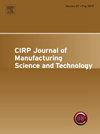新型网状生物可吸收冠状动脉支架的微注射成型制造技术
IF 5.4
2区 工程技术
Q2 ENGINEERING, MANUFACTURING
CIRP Journal of Manufacturing Science and Technology
Pub Date : 2025-04-17
DOI:10.1016/j.cirpj.2025.04.002
引用次数: 0
摘要
生物可吸收心血管支架(BCS)代表了医疗技术的重大进步,为患病动脉提供临时支持,同时消除了永久性植入物相关的长期风险。然而,传统的制造方法涉及多个步骤,使得BCS成为昂贵的医疗设备。为了应对这一挑战,净形状制造技术已经成为简化生产和促进大规模生产的一种有前途的方法。微注射成型(μIM)是生产具有精确几何形状和表面光洁度的BCS的可行方法。然而,BCS固有的几何复杂性和材料较差的熔体流动指数(MFI)是μIM成功制造的重大障碍。本研究用生物基增塑剂柠檬酸三乙酯(TEC)对聚乳酸(PLA)进行改性,以提高其MFI和加工性能。对PLA-TEC配方进行了综合表征,包括机械强度、热稳定性和流变性能,以优化μIM材料的性能。随后,利用响应面方法优化工艺参数,以减轻制造缺陷,如欠填充和闪光形成,确保生产高质量的BCS。通过系统的材料改性和工艺优化,该研究成功地证明了μIM在提高几何保真度的情况下实现低成本、大批量生产BCS的可行性。本文章由计算机程序翻译,如有差异,请以英文原文为准。
Novel net-shape manufacturing of bioresorbable coronary stents using micro-injection molding process
The bioresorbable cardiovascular stent (BCS) represents a significant advancement in medical technology, offering temporary support to diseased arteries while eliminating the long-term risks associated with permanent implants. However, traditional fabrication methods involve multiple steps, rendering BCS a costly medical device. To address this challenge, net-shape manufacturing techniques have emerged as a promising approach to streamline production and facilitate mass manufacturing. Micro-injection molding (μIM) is a viable method for producing BCS with precise geometries and surface finishes. Yet, the inherent complexities of BCS geometry and the poor melt flow index (MFI) of material present significant obstacles to successful μIM fabrication. In this study, poly-lactic acid (PLA), was modified with triethyl citrate (TEC), a bio-based plasticizer, to enhance its MFI and processability. A comprehensive characterization of the PLA-TEC formulations was conducted, encompassing mechanical strength, thermal stability, and rheological behavior, to optimize material performance for μIM. Subsequently, process parameters were optimised utilising response surface methodology to mitigate manufacturing defects such as underfilling and flash formation, ensuring the production of high-quality BCS. Through systematic material modification and process optimization, this study successfully demonstrates the feasibility of μIM for cost-effective, high-volume production of BCS with improved geometric fidelity.
求助全文
通过发布文献求助,成功后即可免费获取论文全文。
去求助
来源期刊

CIRP Journal of Manufacturing Science and Technology
Engineering-Industrial and Manufacturing Engineering
CiteScore
9.10
自引率
6.20%
发文量
166
审稿时长
63 days
期刊介绍:
The CIRP Journal of Manufacturing Science and Technology (CIRP-JMST) publishes fundamental papers on manufacturing processes, production equipment and automation, product design, manufacturing systems and production organisations up to the level of the production networks, including all the related technical, human and economic factors. Preference is given to contributions describing research results whose feasibility has been demonstrated either in a laboratory or in the industrial praxis. Case studies and review papers on specific issues in manufacturing science and technology are equally encouraged.
 求助内容:
求助内容: 应助结果提醒方式:
应助结果提醒方式:


